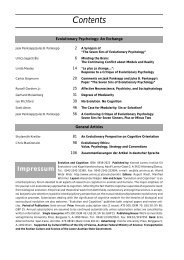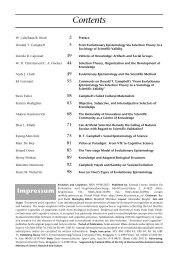Contents - Konrad Lorenz Institute
Contents - Konrad Lorenz Institute
Contents - Konrad Lorenz Institute
You also want an ePaper? Increase the reach of your titles
YUMPU automatically turns print PDFs into web optimized ePapers that Google loves.
Some Perhaps Surprising Consequences of the Cognitive “Revolution”<br />
6. Jerome BRUNER and colleagues published their<br />
seminal A study of thinking (BRUNER/GOODNOW/AUS-<br />
TIN 1956) outlining a set of heuristic devices that<br />
people used in problem solving. This book championed<br />
the employment of what became known some<br />
decades later as “top-down” cognitive procedures<br />
for tackling complex, logical problems.<br />
7. When the decade of the 1950s ended, it did so,<br />
not with a whimper, but with a distinct bang. In<br />
1959 a then-obscure linguist named Avram Noam<br />
CHOMSKY wrote a rather astonishing demolition of<br />
B. F. SKINNER’s behaviorist treatise, Verbal Behavior<br />
(SKINNER 1957). CHOMSKY’s critique (CHOMSKY 1959),<br />
one of the most influential book reviews in the history<br />
of the academy, was a scholarly “dusting up”<br />
which quite thoroughly put to rest any lingering<br />
hopes for a non-mentalist approach to the problems<br />
of language and thought. 3<br />
8. The turn of the decade saw the publication of<br />
MILLER, GALANTER and PRIBRAM’s (1960) Plans and the<br />
structure of behavior which outlined how important<br />
the establishment of cognitive planning was for virtually<br />
everything interesting that people did. This<br />
book presented the logical extension of the arguments<br />
put forward a decade earlier by LASHLEY<br />
(1951) in that MILLER, et al. showed how serial behaviors<br />
like speaking, typing, playing the piano, or<br />
riding a bicycle, which befuddled behaviorist analysis,<br />
could be handled simply by introducing the notion<br />
of a plan.<br />
9. During the early 1960s psychology discovered,<br />
rather belatedly, first Jean PIAGET and then Lev VY-<br />
GOTSKY and the entire enterprise of developmental<br />
psychology changed overnight. Piaget, a scholar<br />
whose work emphasizing the stages of cognitive development<br />
had been quite influential in Europe, finally<br />
found receptive ears over here across the Atlantic.<br />
Vygotsky, whose impact had been largely<br />
restricted to the Soviet Union and Eastern Europe,<br />
emphasized the role of meaning in language and<br />
the importance of social components. Children<br />
quickly went from being viewed as organisms characterized<br />
by stimulus–response mechanisms to epistemologically<br />
sophisticated beings with rich, evolving,<br />
cognitive and social systems.<br />
10. North Americans discovered the work of a<br />
number of British scholars who, owing to their reluctance<br />
to embrace radical behaviorism, had been<br />
largely overlooked. Particularly influential were the<br />
perspectives of BARTLETT (1932), CHERRY (1953,<br />
1957) and BROADBENT (1958), all of whom encouraged<br />
the development of more complex models of<br />
perceptual and cognitive functioning.<br />
One of the intriguing features of this shift toward<br />
a cognitivist world was the introduction into psychology<br />
of the work of scholars trained elsewhere,<br />
in other traditions with other values and holding, of<br />
course, other prejudices. Psychology was inundated<br />
with the ideas and priorities of linguists (CHOMSKY),<br />
anthropologists (SEBEOK), mathematicians (LUCE),<br />
physicists (BUSH), engineers (SHANNON), communications<br />
specialists (CHERRY), computer scientists<br />
(NEWELL), statisticians (MOSTELLER), biologists<br />
(PIAGET), and political scientists (SIMON 4 ). It was all<br />
very KUHNIAN and it all happened very quickly. By<br />
1967 Ulric NEISSER was able to title his seminal volume,<br />
Cognitive Psychology and nobody even blinked.<br />
From a personal perspective, it was an absolute<br />
delight to be among the young students of the field<br />
of psychology in that day. As Thomas KUHN has argued<br />
(KUHN 1962), it is often the young scholars, the<br />
ones who are fortunate enough to arrive on the cusp<br />
of change, who benefit most. Since they have not<br />
yet been indoctrinated into any particular paradigmatic<br />
framework, they are free to adapt to the new<br />
and the adventurous. Indeed, I and many of my<br />
peers found ourselves unencumbered by behaviorist<br />
tenets and free to follow the new winds blowing<br />
through the academy. And it was great fun. The revolution<br />
was in full swing and it wouldn’t be long before<br />
we could actually use words like “representation”<br />
and “consciousness” and still get our articles<br />
published in peer-reviewed journals. A heady time<br />
indeed.<br />
The Intellectual Cost of the Revolution<br />
But, as was hinted at earlier, there was a price being<br />
paid for all this, and for a long time, no one seemed<br />
to notice. Experimental and theoretical psychology,<br />
having been largely swept up in the cognitive revolution,<br />
took on a particular cast, one that was characterized<br />
by: (a) a fascination with the problems of<br />
memorial representation while slighting the problem<br />
of how knowledge is acquired and, (b) a neglect<br />
of the basic DARWINIAN heuristics, the ones that<br />
counsel us to question whether proposed models<br />
and theories make sense in terms of the adaptationist<br />
principles of evolutionary biology.<br />
As these shifts in interest wove their way through<br />
our discipline they left their fingerprints behind in<br />
the form of some raw but useful numbers that can<br />
be used to chart them. The following sections<br />
present historical data mapping out the waxing and<br />
waning of interest in each of the key topics of learning,<br />
memory, and evolution. They are in the form of<br />
Evolution and Cognition ❘ 105 ❘ 2003, Vol. 9, No. 2








